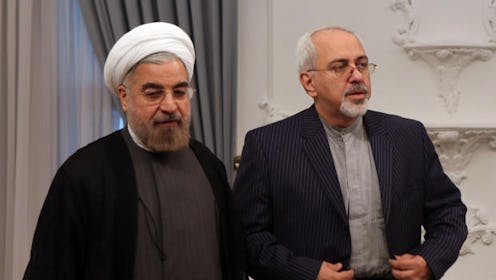News
Is Iran Turning Over A New Leaf?

What’s going on in Iran? First, the new president went out of his way to wish Jews a happy Rosh Hashanah; now, he’s attempting to wrestle control of the country’s nuclear negotiations with the West away from the Supreme Leader, Ayatollah Khamenei.
President Hassan Rouhani announced Thursday that in future negotiations with the West over Iran’s nuclear program, the Islamic Republic will be represented by the foreign ministry, not Khamenei’s Supreme National Security Council (SNSC). While it’s too soon to say whether this will produce a substantive shift in policy, the differences between the two entities is stark, and could have significant implications for U.S.—Iran relations.
Since 2007, Iran’s delegation at nuclear talks has been Saeed Jalili, secretary of the SNSC and a veteran of Iran’s 1980 war against Iraq. Jalili is seen as both a Khamenei loyalist and a nuclear hard-liner. He’s stubbornly defended his country’s right to wield nuclear power in negotiations with the West, and espoused similar views in his failed presidential campaign last year.
Under Jalili’s stewardship, negotiations with the West have regarding Iran’s nuclear program have been mostly fruitless. But that could change when the foreign ministry takes the reins.
The ministry is run by Mohammad Javad Zarif, in some ways the polar opposite of Jalili. A graduate of the University of Denver and fluent English speaker, Jalili has worked mainly in diplomatic posts during his tenure in the government. He’s generally perceived by the West as a moderate with a dogged dedication to improving U.S.—Iranian relations.
“He was always trying to do what was possible to improve relations in a very intelligent, open and clear way," one Western diplomat told Reuters. “This is someone who knows the United States very well and with all the frustrations of the past is still someone they know in Washington.”
Zarif was sidelined during the hard-line administration of President Mahmoud Ahmadinejad, but his appointment to the ministry by Rouhani earlier this year was widely seen as a conciliatory gesture toward the West.
It’s too soon to say whether the foreign ministry, or Zarif, will help nudge the U.S. and Iran closer to a deal regarding the country’s nuclear power, but when it comes to something as high stakes as nuclear weapons, we’ll take a moderate diplomat at the table over a hardline nationalist any day.
Image: Getty